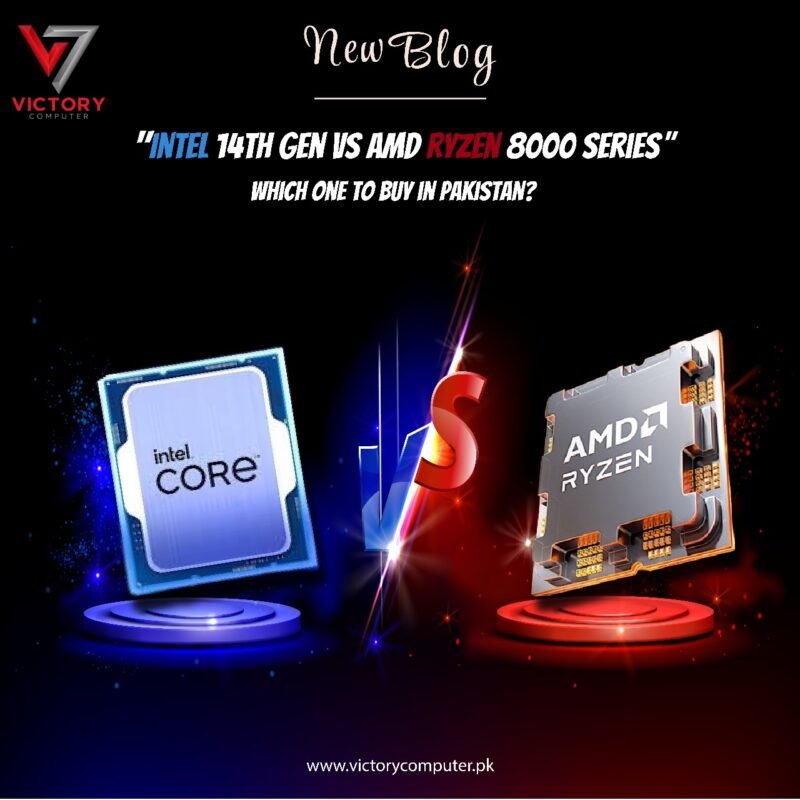In the ever-evolving world of computing, choosing the right processor is crucial. With Intel’s 14th Gen and AMD’s Ryzen 8000 series making waves in 2025, consumers in Pakistan are faced with a tough decision. This guide aims to provide a comprehensive comparison to help you make an informed choice based on performance, efficiency, and value.

Performance Overview
Intel 14th Gen (Raptor Lake Refresh):
- Features a hybrid architecture combining Performance (P) and Efficiency (E) cores.
- Excels in single-threaded tasks, making it ideal for applications like Adobe Photoshop and certain gaming scenarios.
- Offers robust overclocking capabilities for enthusiasts seeking maximum performance.
AMD Ryzen 8000 Series (Zen 5):
- Built on a 4nm process, delivering superior power efficiency.
- Dominates in multi-threaded workloads, benefiting tasks like video editing and 3D rendering.
- The X3D models, with 3D V-Cache technology, provide exceptional gaming performance, often surpassing Intel’s offerings
Power Efficiency and Thermal Management
AMD’s 4nm architecture ensures lower power consumption and cooler operation, making Ryzen 8000 series processors suitable for compact builds and energy-conscious users. Intel’s 14th Gen chips, while powerful, tend to consume more power and generate more heat, necessitating robust cooling solutions.
Price and Value in Pakistan
In the Pakistani market, AMD processors often provide better value for money, offering high performance at competitive prices. Intel’s processors, while slightly more expensive, deliver strong single-threaded performance and are favored by users with specific application needs.
Platform Longevity and Upgrade Path
AMD’s commitment to the AM5 socket ensures a longer upgrade path, allowing users to upgrade CPUs without changing the motherboard. Intel’s 14th Gen processors use the LGA 1700 socket, but future generations may require new motherboards, potentially increasing upgrade costs.
Gaming Performance
For gamers, AMD’s Ryzen 8000 series, particularly the X3D variants, offer exceptional performance in modern titles, thanks to the 3D V-Cache technology. Intel’s 14th Gen processors also perform admirably, especially in games that favor high clock speeds and single-threaded performance.
AI and Productivity Workloads
Intel’s 14th Gen processors incorporate AI acceleration features, benefiting applications that leverage machine learning and AI tasks. AMD’s Ryzen 8000 series also supports AI workloads, with improvements in NPU performance, making both suitable for AI-driven applications .
Where to Buy in Pakistan
For authentic products and competitive prices, consider purchasing from reputable retailers like Victory Computer, located in Hafeez Center, Lahore. They offer a wide range of Intel and AMD processors, ensuring you find the right fit for your needs.
Conclusion
Both Intel’s 14th Gen and AMD’s Ryzen 8000 series processors offer compelling features. Your choice should depend on your specific requirements:
Choose AMD Ryzen 8000 Series if you prioritize:
- Multi-threaded performance for tasks like content creation.
- Energy efficiency and cooler operation.
- Long-term upgrade paths with the AM5 socket
Choose Intel 14th Gen if you prioritize:
- High single-threaded performance for specific applications.
- Robust overclocking capabilities.
- Advanced AI acceleration features.

 Due to fluctuation in dollar/dirham rates, prices are not stable kindly confirm the price before placing the order.
Due to fluctuation in dollar/dirham rates, prices are not stable kindly confirm the price before placing the order.